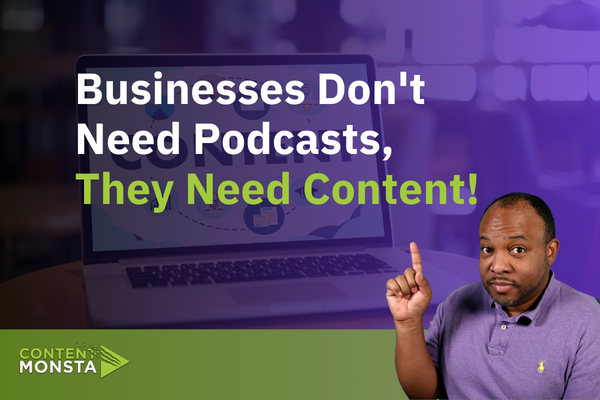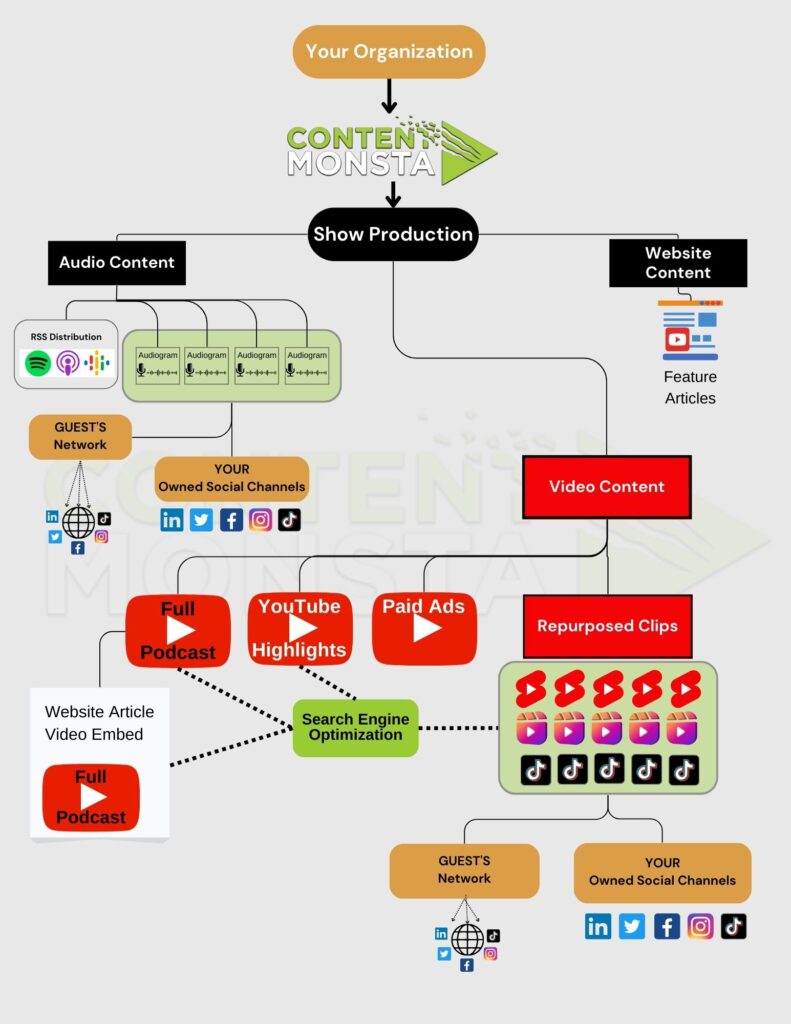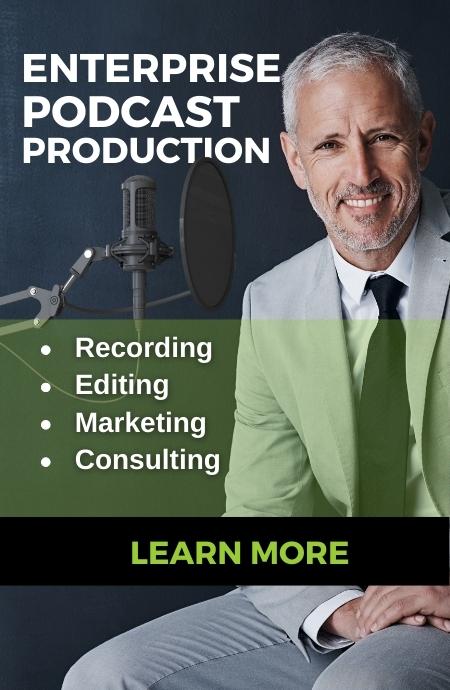Businesses Don’t Need Podcasts, They Need Content! Let that sink in for a moment.
Contrary to what many podcast agencies might tell you, businesses don’t fundamentally need podcasts. They need content, the lifeblood of any digital marketing strategy.
Why do I say this? Because content is what drives customer engagement, SEO, and brand loyalty. The medium is secondary.
But here’s the twist. Podcasts are actually one of the best vehicles to deliver that oh-so-crucial content. Don’t see it as just a podcast; see it as a content engine.
Podcasts Are Multifaceted Content Generators
When you invest the time and effort into creating a podcast episode, you’re doing more than just recording a conversation or monologue. You’re actually creating a valuable piece of content that can serve you in multiple ways across your marketing landscape. Think of it as a tree: the podcast is the trunk, and from it, you can grow various branches of content that serve different needs.
A Single Episode, Multiple Outputs
Consider a single episode of your podcast that you’ve spent time meticulously planning, recording, and editing. You’ve created an audio file, but that’s just the tip of the iceberg. Now, let’s look at how that one episode can be dissected into different types of content:
- Blog Posts: Take key points from your podcast episode and turn them into a well-structured blog post. You don’t need to transcribe the episode word for word; rather, focus on the valuable insights, the “aha” moments that can benefit your audience.
- Social Media Snippets: Create short, impactful quotes or takeaways from your episode. These could be turned into graphics, or even audio snippets that can be shared across social media platforms. These pieces are easily digestible and encourage people to seek out the full episode.
- Video Clips: If you record your podcast episodes on video as well, snippets can be used for YouTube shorts, Instagram reels, or even LinkedIn videos. Each platform has its own audience, and by repurposing your podcast content, you’re broadening your reach.
- Infographics or Slide Decks: Data points, statistics, or even the flow of your discussion can be turned into visual elements. Infographics and slide decks can be easily shared and can make complex information more accessible.
Reach a Broader Audience
Podcasts hold a unique advantage when it comes to capturing an audience’s attention: they fit effortlessly into people’s lives. You see, content consumption is often about convenience. While some might love the deep dive a long-form blog post offers, others may prefer content they can engage with while multitasking. And that’s where podcasts truly shine.
The Power of Passive Consumption
One of the main perks of a podcast is that it enables passive consumption. Your audience can listen while driving, exercising, or even doing household chores. This kind of flexibility can expand your reach significantly. You can connect with people who might have never encountered your brand otherwise simply because they prefer auditory content over written or visual mediums. Here are a few practical tips for reaching a diverse audience:
- Know Your Audience Segments: Use analytics to understand the different types of listeners you’re attracting. Are they young professionals, parents, or perhaps a mix of both? Tailor your episodes to meet the interests and concerns of these varied groups.
- Leverage Social Media: Use your social media platforms to promote episodes and gather feedback. Ask questions like, “What topics do you want us to cover next?” This not only engages your audience but provides valuable insights into their preferences.
- Feature Guest Speakers: Bring in experts or influencers from various fields who can offer new perspectives. This can attract their followers to your podcast, thus expanding your audience.
- Use Transcripts for SEO: A transcript of your podcast can make it searchable. This means that someone looking for information on a topic you’ve covered can find your podcast even if they initially set out to read about it.
Build Thought Leadership
One proven way to distinguish your brand and build credibility is through thought leadership, and podcasts are a fantastic tool for this endeavor. Let’s look at why this medium is particularly effective for elevating your brand’s authority and how it impacts your relationship with customers.
Lending a Voice to Your Expertise
It’s one thing to write an insightful article; it’s another to discuss those insights in a conversational setting where you can elaborate on points, share anecdotes, and even respond to questions in real time. Podcasts allow for a deeper, more nuanced exploration of topics. This kind of candid discussion often resonates more with audiences because it feels authentic and unscripted.
Expert Interviews: A Win-Win Situation
Having guest experts on your podcast is beneficial for everyone involved. For the expert, it’s a platform to share their knowledge. For you, it’s an opportunity to align your brand with industry leaders, which adds credibility. For the listener, it’s a chance to gain different perspectives on a topic. The synergies created in this setting can quickly position your brand as a go-to source for quality information.
Consistency Builds Trust
When you regularly publish podcast episodes that offer value, you’re essentially training your audience to rely on you for quality content. Each valuable episode strengthens your reputation as a trusted source, and this trust is crucial for building lasting customer relationships.
Customer-Centric Thought Leadership
Never forget, the end goal of thought leadership is not just to showcase your knowledge but to offer something of value to your customers. Maybe they want to stay updated on industry trends, or perhaps they’re looking for solutions to specific problems. By focusing your content on the customer’s needs, you make your brand more relatable and approachable.
Great for SEO
You might think of podcasts primarily as an auditory experience, but their value extends far beyond just sound. One often overlooked benefit is how they can significantly boost your SEO (Search Engine Optimization) efforts. Let’s dig into why and how.
From Audio to Text: The SEO Goldmine
When you transcribe a podcast episode, you’re turning that rich, informative dialogue into written text. Why is this so useful? Because search engines can’t ‘listen’ to your podcast, but they can ‘read’ the transcription. The key terms, topics, and insights you’ve discussed become indexable, searchable content. That’s huge for your website’s visibility on search engines like Google.
EEAT: The Pillars of Content Quality
Google uses a set of criteria known as EEAT—Expertise, Authoritativeness, and Trustworthiness—to evaluate the quality of content. A well-executed podcast can showcase all three:
- Expertise: Through insightful discussions, interviews with industry experts, or breaking down complex topics, your podcast reflects your in-depth knowledge in your field.
- Authoritativeness: Consistency and quality over time help establish you as an authority in your subject matter.
- Trustworthiness: By providing accurate, reliable information, you’re building trust with your audience, which search engines take into account.
Customer-Focused SEO
Here’s the thing: SEO isn’t just about pleasing algorithms; it’s ultimately about serving your customers. When your content ranks well because it’s rich in expertise, authoritativeness, and trustworthiness, you’re more likely to attract customers genuinely interested in what you have to offer. They’re finding you because you have the answers to their questions, solutions to their problems, or insights into their interests.

Customer-Centric Approach
The core of content marketing is delivering value to the customer. Podcasts offer a uniquely intimate way to connect with your audience, delivering not just information but value. Let’s unpack how a customer-centric approach to podcasting can create meaningful interactions and build trust between you and your audience.
Tailored Content for Real Needs
One of the biggest advantages of podcasts is the capability for deep dives into topics. You’re not confined by word counts or attention spans in the same way as you are with blog posts or social media updates. This allows for more comprehensive coverage of issues that your audience cares about. For instance, if you’re in the health and wellness industry, a podcast can discuss the intricacies of mental well-being, rather than just offering quick tips. The message is clear: you understand your customers’ needs and you’re here to offer real, substantial help.
Building Trust Through Authentic Conversations
A podcast isn’t a monologue; it’s a dialogue, often involving multiple viewpoints. This conversational aspect helps humanize your brand. When listeners hear real discussions, perhaps even a little humor or storytelling, it’s easier for them to trust you. They’re more likely to think, “This brand gets me,” which is a vital step in building a long-term relationship.
Measure What Matters
You’ve got your podcast up and running, you’re delivering fantastic content, and you’re excited about the traction it’s gaining. But how do you know if it’s genuinely contributing to your business goals? The key lies in measuring what truly matters. Let’s discuss how to assess your podcast’s success through a business lens, rather than just relying on traditional podcast metrics.
Beyond Downloads: The Metrics That Count
While it might be tempting to focus on the number of downloads or listens, these figures can be misleading. They may give you a general idea of reach, but they won’t provide insights into customer engagement or behavior. Here are some metrics that are more aligned with business impact:
- Engagement: Are listeners sticking around for the entire episode, or are they dropping off after a few minutes? High engagement rates can indicate that your content is resonating with your audience.
- Lead Generation: If you have calls to action in your podcast, like signing up for a newsletter or downloading a guide, track how many leads are generated from those specific channels.
- Customer Retention: Do you see an uptick in returning customers or increased loyalty metrics among those who engage with your podcast? This can be a strong indicator of your podcast’s value in keeping customers engaged over the long term.
Customer-Centric Metrics
Remember, your ultimate goal is to provide value to the customer. So, consider metrics that directly gauge customer satisfaction:
- Customer Feedback: This could be in the form of reviews, ratings, or direct feedback via social media or email. Are listeners finding value in your podcast?
- User Behavior: Use analytics tools to track listener behavior post-engagement. For example, if a listener clicks on a resource link mentioned in your podcast, that’s a good sign they found your content valuable enough to take additional action.
So, the next time someone says you need a podcast, correct them. What you actually need is content, and a podcast might just be the most efficient way to get it.
Don’t underestimate the power of a well-executed podcast as part of your broader content strategy!
If you’ve read this far, you probably need help executing all of this, so reach out to us at when you’re ready. Until then, check out this article to explore Content Monsta’s innovative approach to video podcast transformation and its profound impact on podcast promotion.

The QvQ Content Funnel: Ending the Quality versus Quantity Question
Marketers often debate whether to prioritize the quality or quantity of content. The QvQ Content Funnel proposes a strategy to balance both, tailoring content type and volume to different sales funnel stages. This method enhances engagement, drives conversions, and builds customer loyalty by delivering the right content at the right time.

5 Digital Marketing Content Types That Drive Business
There are several digital marketing content types that are sure to drive business over the coming years. It’s no secret that content marketing is the driving force behind most, if

Marketing Video Budget – How to secure executive approval
Discover how to secure executive approval for your video marketing budget. This article teaches you to address the critical concerns of CFOs and CMOs, focusing on efficiency, cost-effectiveness, and ROI. Learn strategies for promoting quick turnarounds, diversifying video content, and implementing remote production. Equip yourself with the tools to present a strategic, results-oriented plan that aligns with your company’s goals and impresses your executives.





